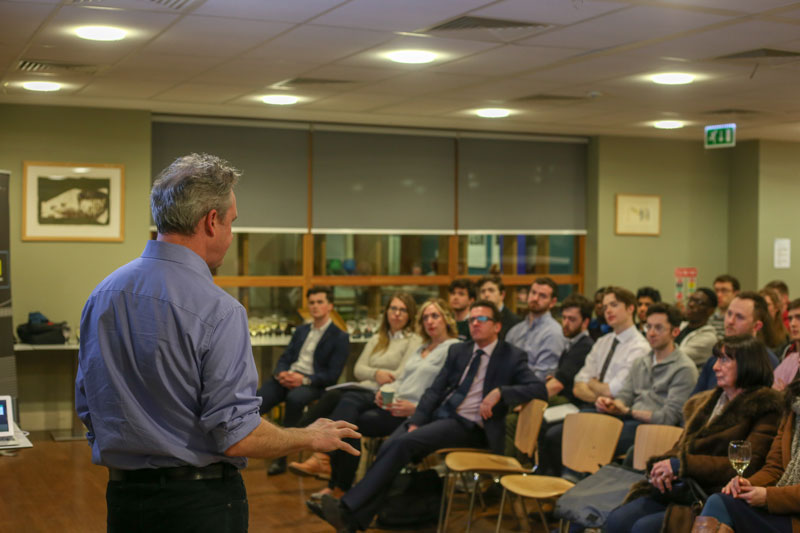The second Trinity Healthcare Entrepreneurship Forum took place on Tuesday evening in the Knowledge Exchange Area of the Trinity Biomedical Sciences Institute (TBSI), lovingly known as the “Kea” by the students inhabiting this part of campus. Advertised as a rare opportunity to “pick the brains” of well-known and successful entrepreneurs and innovators, the forum welcomed three speakers with various outlooks and experiences. The event was supported by the Blackstone LaunchPad.
The first to address the audience was Dr. Jeremy Skillington, whose presentation gave a comprehensive insight into the world of medical innovation and business development. For those who may be interested in a career in pharmaceuticals or biotechnology, Skillington’s address was certainly valuable, explaining the relationship between pharma and biotech companies is almost like “speed-dating”, where they pair up businesses to achieve their goals. Biotechnology is very important in the medical world and people like Lindsay Rosenwald invest in these industries to help develop medicines that are very much needed not only in America but in other parts of the world too. Not only is he a developer he is also a founder of some biotech companies and has his own too.
According to Skillington, it’s a “win-win situation”, as biotech companies pay a lot of money for the pharmaceutical and then they develop it. His speech was peppered with enough science in-jokes to ostracise an art student, quipping that he’s a “JAK of all trades” to laughter.
He explained that the purpose of a business developer in biotechnology is to help the company, check their funding and look after intellectual property – a topic to the fore of most of the evening’s addresses. Skillington currently works with Trinity company Inflazome, which is developing treatments for inflammatory diseases.
In a question pitched at every speaker, in turn, the idea of many developing drugs being more preventative than anything else came up, leading Skillington to compare some of these drugs to brushing your teeth. You brush your teeth in the morning and take a pill to prevent inflammatory diseases, as an everyday routine.
Ciara Donlon is the CEO and founder of Theya Healthcare, a company that develops lingerie for post-operative patients, most notable bras for women who have recently undergone breast surgery.
Donlon said she believes that her “entrepreneurial spirit” was always lurking as she didn’t last in a post for more than two years, and had worked online before it was “sexy”. However, entering the entrepreneurial world, she was dismayed at the lack of female role models. Only 2.2 percent of venture capitalist funding is awarded to women entrepreneurs, she said. She also noted that once she changed her company’s name from Theya Lingerie to Theya Healthcare, the reaction from potential investors tended to be more serious.
The “ethos” behind Theya is to provide comfortable and supportive lingerie to women post-operatively – not a very big ask once someone has had a breast removed. However, hospitals tend to prescribe uncomfortable bras to women, so much so that when one patient changed to a Theya bra she “cried from relief”, which Donlon thinks is “unnecessary”. Donlon described her innovation to be part of the aftercare that “falls between two stools”, which no one seemed to pay much attention to. Donlon has enjoyed a considerable amount of success, receiving Laureate for Europe in Cartier Women’s Initiative Awards.
Dr. John McKeon, Co-founder, and CEO of Allergy Standards Ltd and a Trinity alumnus started his address by saying that everyone should have an entrepreneurial mindset, even if working towards a career in medicine.
Answering a question from the audience about medicine being a good starting point for innovation, McKeon was adamant that he “uses medicine every day”, having graduated from medicine in Trinity in 1996 and training as a surgeon before becoming an entrepreneur.
He maintains that becoming an entrepreneur is equal to the value a doctor gives society by creating wealth and jobs. Continuing one of Donlon’s points, he declared that “the time is now” for women in innovation, adding that in America there are more men named John than women who are entrepreneurs.
McKeon heavily emphasized the need for future medical professionals to become involved in innovation, as it “fuelled the recovery” after the recession. Since then, he said, intellectual property has taken over the place expensive housing developments once occupied in the economy. He discussed the tendency of companies to use false labels like “hypoallergenic”, which according to the FDA doesn’t need to have any proof to be used. But now, he says, “the world is changing. People won’t put up with shady products”.
When it came to questions from the audience, many were industry-specific, but many also touched on issues of knowing when to give and up and the fear of failure. When an audience member asked about “jumping ship” from a project, Skillington recounted a phrase of “jumping off a cliff and assembling the plane on the way down”. While his time so far has been “phenomenal”, he maintained that if something isn’t working out, you take it with you somewhere else. Taking a career leap can be “traumatic”, but Skillington emphasized that you have to immerse yourself.
Being outside of your comfort zone is vital, they all agreed. “I’ve been uncomfortable for 20 years”, Skillington said.







